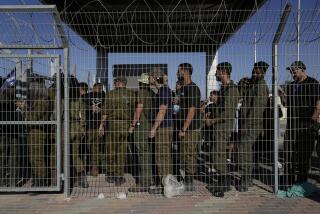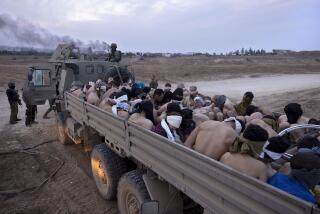Baghdad Turns Deaf Ear to Red Cross Plea to See POWs
AMMAN, Jordan â All allied prisoners of war in Iraq remain strictly off limits to the International Committee of the Red Cross, despite many formal appeals to Baghdad and hundreds of similar Red Cross visits to Iraqi prisoners now being held in Saudi Arabia and Britain, the committeeâs president told reporters in Amman on Sunday.
Cornelio Sommaruga, who heads the Geneva-based humanitarian agency, conceded at the press conference that the POW issue âis a delicate one,â but he made it clear that his agency has been deeply frustrated in its efforts to enforce the Geneva Conventions on the prisoners issue, declaring: âThe ICRC is not an army. The ICRC is not the police.â
Sommaruga added, however, that neither side is blameless in its behavior in the Gulf War, and he appealed for the creation of âsecurity zonesâ to shield Iraqi civilians and foreigners inside Iraq from the relentless allied air war.
âThe law of war does not allow everything. There are limits,â said Sommaruga, whose agency is charged with enforcing all Geneva Conventions covering the actions of nations during wartime.
During several days of meetings with officials here in Jordan, among them the Iraqi ambassador, the Red Cross chief said his attention has been âdirected to the civilian victims in Iraq and Kuwait, and there is a great need of enhancing the assistance to be given to these victims.â
Specifically, Sommaruga appealed to the Iraqis to permit the Red Cross to bring in emergency food supplies, field hospitals, vitally needed medicines, and other shipments that are permitted under the U.N. sanctions resolutions against Iraq but ones that the Baghdad regime has resisted because it refuses to permit either U.N. or Red Cross inspections of the goods and because it does not recognize the legitimacy of any of the U.N. sanctions against it.
But he also appealed to allied commanders to âleave some space for the civilian population to be safeâ--âsecurity zonesâ that would include hospitals and possibly even geographical areas within Iraq that the allies would agree not to bomb.
âThis is fundamental. This is in the Geneva Conventions,â the Red Cross chief said, adding that it âcould even be a whole town, a whole village.â
Sommaruga declined during his press conference to comment on individual cases of reported civilian casualties and attacks on civilian installations in the war. Allied military briefers in the Gulf call these cases âcollateral damageâ and assert that civilians are never deliberate targets.
On the prisoners of war issue, the Swiss-born Red Cross president did lay specific blame on authorities in Baghdad.
âThe International Committee of the Red Cross is visiting a large number of Iraqi prisoners of war in Saudi Arabia and in . . . Britain,â he said, referring to hundreds of Iraqi soldiers captured during clashes on the Kuwaiti border and to Iraqi civilians interned in British jails on charges relating to espionage or suspected involvement in terrorism.
âFor the time being, we have not yet had access to the prisoners of war of the coalition partners in Iraqi hands,â he added.
Several formal appeals to the Iraqi regime âhave met with no answer,â Sommaruga said, adding that Iraq similarly has refused his request to visit Baghdad personally in an effort to resolve all matters relating to the Geneva Conventions.
Iraqâs latest public statement on the prisoners issue came during a press conference in Amman last week by Iraqâs deputy foreign minister, Mohammed Sahaf, who indicated that Baghdad would not permit Red Cross access to allied POWs until the allies stop bombing Iraqi civilians.
âWhen the aggressors respect the Geneva Conventions,â Sahaf said, âwe on our part will respect these conventions too.â
Still, Sommaruga closed the prisoners issue on a hopeful note.
âWe expect that all parties to this conflict, and these are all parties to the Geneva Conventions as well, will give us access to these prisoners of war without further delay,â he said.
There were other developments Sunday on the humanitarian front of the Gulf War.
Trucks carrying 50 tons of emergency medicine and surgical supplies, which are specifically earmarked for the treatment of mothers and children, arrived in Baghdad in a U.N. Childrenâs Fund convoy from neighboring Tehran. UNICEF, which had appealed to the allies for safe conduct for the convoy, reported that it encountered no air strikes along the route.
The convoy, which was organized in conjunction with the World Health Organization, included a seven-member team that will report on the overall health needs of Iraqâs women, children, elderly and others that the United Nations considers in the âmost vulnerableâ groups among Iraqâs civilians.
A group of Jordanian doctors, bringing with them several tons of emergency medical supplies, also arrived in Baghdad on Sunday. The convoy was organized by the Jordan Red Crescent, an affiliate of the Red Cross.
BACKGROUND
Red Cross involvement in the treatment of prisoners of war dates from 1864, when delegates from 16 nations met in Switzerland and the Geneva Convention for the Amelioration of the Condition of the Wounded and Sick of Armies in the Field was signed by 12 of the nations represented. It provides for the neutrality of the personnel of medical services of armed forces, the humane treatment of wounded, the neutrality of civilians who voluntarily assist them and the use of an international emblem to mark medical personnel and supplies. In honor of the host country, the reverse of the Swiss flag was adopted as a symbol: a red cross on a white background.
More to Read
Sign up for Essential California
The most important California stories and recommendations in your inbox every morning.
You may occasionally receive promotional content from the Los Angeles Times.










